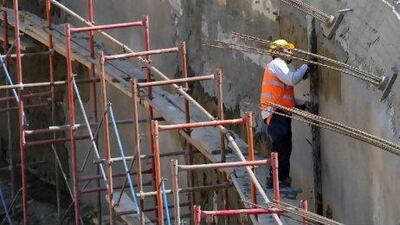Egypt's cement sector is paying a price for the revolution that ousted president Hosni Mubarak four months ago, CI Capital said yesterday.
Sinai Cement, based in Cairo, was downgraded to "hold" from "strong buy" as the repercussions from the unrest on the company became clear.
Its plant was attacked by activists, forcing it to shut down for 11 working days. The bombing of a pipeline in El Arish in April also forced the company to switch to costly mazut fuel oil as a temporary replacement for natural gas. The producer's shares declined 1.3 per cent yesterday to 46 Egyptian pounds, after first-quarter profits declined 25 per cent to 116.8 million pounds compared with the same period last year.
Demand for the country's cement fell 11.7 per cent in the first quarter compared with the same period a year earlier.
Cement prices appear to be on a modest decline, as they decreased from 492 pounds a tonne to 491 pounds, but those numbers do not tell the whole story.
"We learnt from local producers that some of them tend to compensate traders through cash incentives," said Basma Shebeta, an analyst at CI Capital in Cairo. "These producers are actually selling their production at cheaper prices in order to stimulate their local sales."
After accounting for cash incentives, the price paid is estimated to range from 450 to 470 pounds.
Local producers are expecting a price war if major cement producers do not stop cutting prices. Cement is expected to fall further over the coming months particularly with new capacities coming on stream next month from Arabian Cement and the factory owned by Egypt's defence ministry.
Some of the local cement producers were able to export last month, and African countries remained the main destination.
However, many said they could not access outside markets because of an extended export ban.

